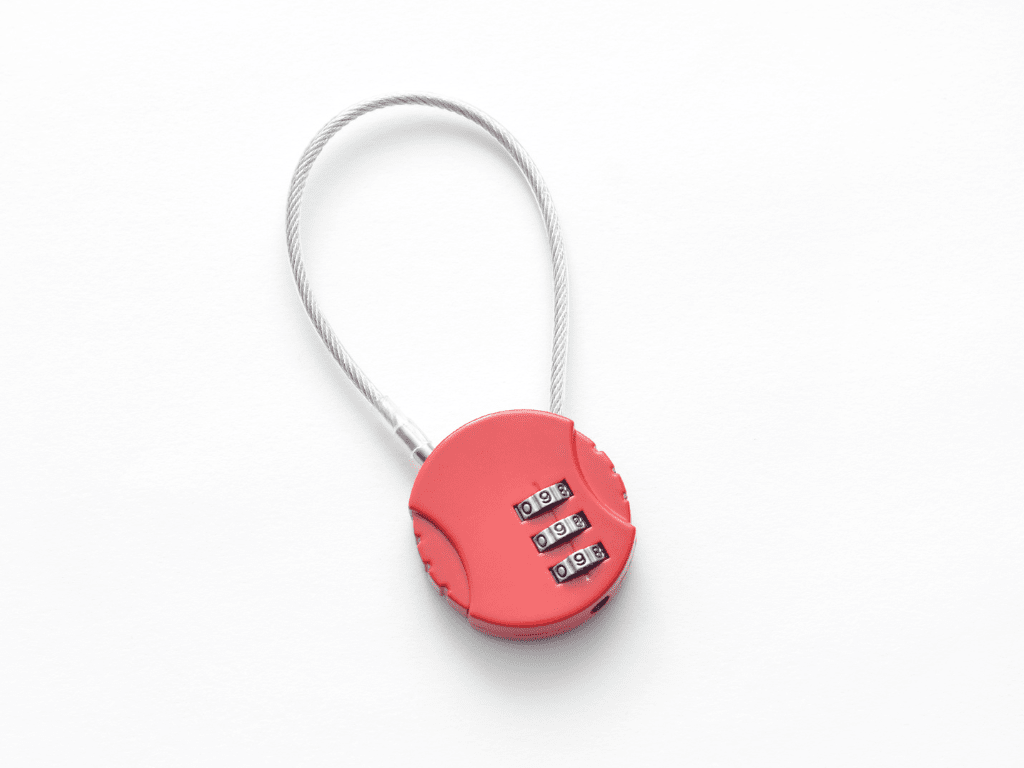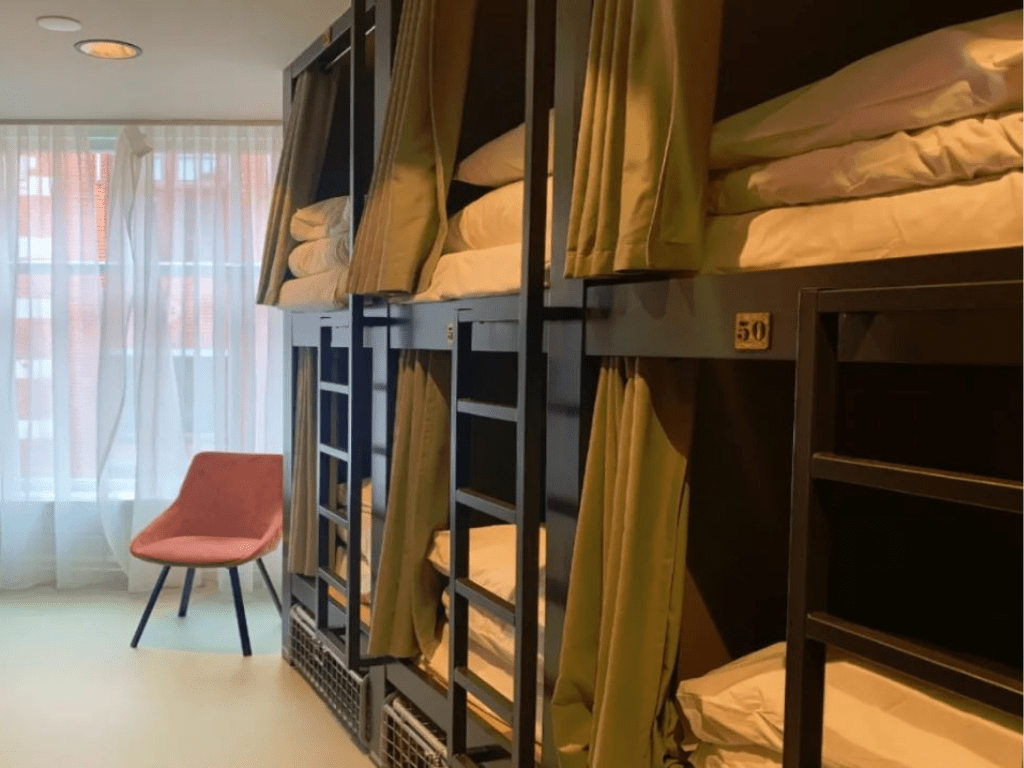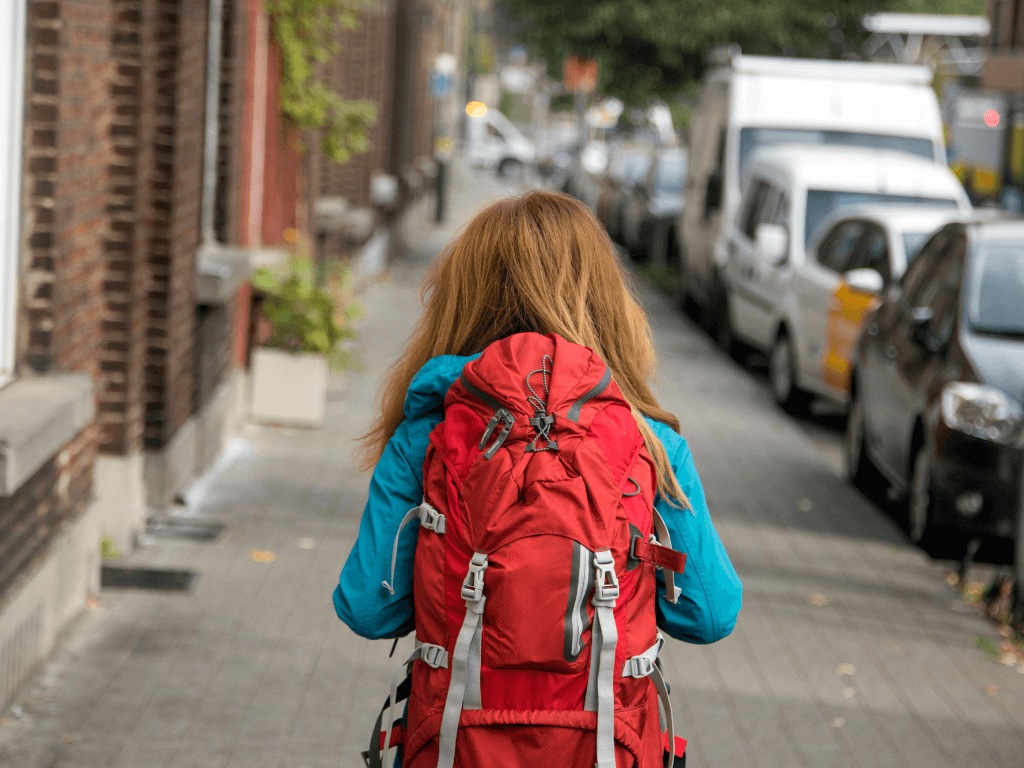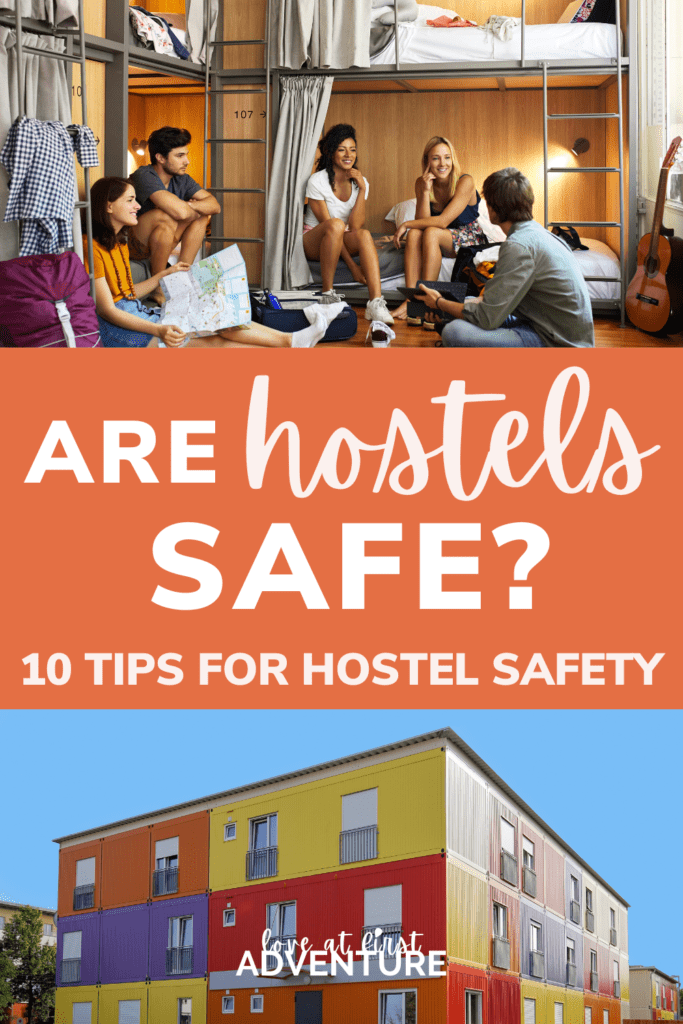Are Hostels Safe? 10 Practical Tips for Hostel Safety
Disclaimer: This article may contain affiliate links. For full information, please see our disclaimer here.
Thinking about staying in a hostel? This article answers the question, “Are hostels safe?” and includes practical tips for hostel safety for your next trip.
Staying in hostels is a wonderful way to experience Europe or any other country—solo or with others. You get a chance to commune with people from all over the world while staying in inexpensive, shared lodging that’s quite an experience in itself.
Whenever I share about hostels, I inevitably have people ask if it’s safe to stay in a hostel.
Generally, staying in a hostel is positive, safe, and clean, too!
It’s not to say that nefarious things never happen at hostels: they can. But, they can also happen anywhere.
The best thing you can do to keep yourself safe—and put your mind at ease so you can enjoy the experience—is arm yourself with knowledge.
Taking all this into account, let’s start with hostel safety info and tips.
Planning a backpacking trip to Europe? Use our favorite resources! ⤵
✈ Flights: Find cheap European flights with Skyscanner
🛌 Hostels: We recommend Booking.com for the best selection of hostels
🚉 Trains & Buses: Omio is safe and easy to use (Full review here!)
📃 Travel Insurance: Safetywing has the best rates for longer trips
📱 Cellular Data: Get connected as soon as you land with an eSIM from Airalo
Are hostels safe?
When you stay in a hostel, the biggest threat you face is petty theft. That is, having your property stolen from you in a location where a thief that is legally allowed to enter.
Cash, wallets, purses, U.S. passports, and smartphones are among the most common items stolen at hostels.
Why? Aside from their obvious value, they’re small. This means it’s easier for thieves to go undetected when committing their crime.
Larger items are a bit harder to hide in a thief’s pocket, but I’ve also heard of people’s brand-name sneakers, laptops, and specialized sports gear going missing.
All this being said, it’s important to understand that petty theft is a crime of opportunity.
It’s your job to use common sense and take precautions to prevent theft. In other words, don’t give thieves the opportunity to steal from you. (Although, it’s not your fault if you’re robbed.)
Violent crime is rare, and travel is very safe in this regard. Actually, European countries like Switzerland, Denmark, and Norway boast some of the lowest violent crime rates in the world. Of course, it’s prudent to stay aware of your surroundings at all times.
Now that we’ve gone over how safe hostels are, let’s get into some practical ways you can protect yourself and your belongings in hostels.
Tips for Hostel Safety
Here are 10 hostel safety tips to consider before your next stay.
1. Keep valuables on you at all times

Knowing that petty crime is a risk at hostels, plan to keep your valuables safe around the clock.
First, never leave money, passports, or other small valuables lying in plain sight.
Even tucking them under your pillow isn’t the best idea, unless you’re sleeping on it!
It’s best to keep your valuables with you while cooking, doing laundry, showering, and especially when sleeping.
To accomplish this, start by purchasing some sort of small security pouch or other bag that you can keep with you at all times. (Check out our hostel packing list for our favorite security bags.)
You can also securely store your valuables in lockers, if provided. More on that in the next section.
2. Use hostel lockers and bring luggage locks

When staying in a hostel, it’s best to bring a way to lock your luggage to prevent theft.
For me, the best travel locks for hostels are these small, TSA-approved cable luggage locks. I appreciate that the cable loops through different sizes of openings on backpacks, suitcases, and lockers!
Often, there are lockers in hostels. Sometimes they even provide keys or combinations. Other times you need to provide your own lock.
“But, thieves can easily cut locks, can’t they?” you say.
Of course, thieves can cut locks. But it’s not likely a thief is going to have the time. He or she is more likely to grab things that are easy targets that can be absconded with quickly.
Plus, they don’t want to draw attention to themselves.
If they went around cutting locks and slashing bags, people would notice!
Another idea is to leave your valuables in the hostel safe. Many hostels have them if you just ask at the front desk.
3. Stay alert and aware of your surroundings
When you’re wrapped up in the excitement of travel, it’s easy to forget to pay attention to your surroundings.
This is why pickpockets strike at crowded tourist areas: because tourists are busy looking at the sights, taking pictures, and chattering away. They aren’t expecting someone to pass by and steal something with a quick slide of hand. However, it happens.
Here are a few things to remember:
- If you wear headphones, keep the volume low or turn on ambient sound to avoid getting lost in another world!
- Make sure you lock the room door when you leave.
- Don’t let people into the hostel. The front desk staff can do that.
- Drink responsibly and never—under any circumstance—take drugs in a foreign country.
To sum up, make smart decisions, and use common sense.
While anything that happens to you is not your fault, it’s best to avoid risky situations and keep your wits about you.
Editor’s Note: All information should be considered educational in nature. It’s up to you to make decisions for yourself as to where, when, and if you decide to stay in a hostel.
3. Keep your items out of view

Since hostel theft is typically a crime of opportunity, try not to flash your belongings around complete strangers.
First, keep your pack organized using packing cubes. This way, you’ll know where everything is and won’t need to dump out the entire contents of your pack in front of strangers.
Next, a sarong or microfiber towel can be used to cover items or give you some privacy.
Hang them in front of your bunk like a curtain. For instance, when you need to count your money or want to zone out using your noise-canceling headphones, curtains create some division.
You can simply throw them over your things, too.
5. Keep an eye on your things
We’ve already established you should keep your valuables with you at all times. But, you should also keep any eye on your other belongings as best you can.
For instance, when you’re charging your phone with a plug adaptor, stay until it’s done charging.
This is one of the reasons I prefer to bring a lightweight portable charger. I can charge my phone on the go or overnight using my battery pack. Besides, if you do need to step away while charging, what would you rather risk getting stolen: your phone or a battery pack? I know my answer.
Another example is laundry. If you’re doing laundry, stay in the laundry room. If the washing machines and dryers lock, set an alarm to get your clothes. This is a courtesy to anyone else who is waiting to wash, not just a safety thing!
Lastly, when you leave your hostel room for the day, pack up, and lock up. Don’t leave anything in plain sight for someone to grab.
6. Make friends, whether you’re staying alone or not

Whether you’re staying in a hostel alone or not, introduce yourself to hostel staff and other hostel-goers, and strike up a conversation.
You can do this in the common room, kitchen, or at events. Note that dorms are for sleeping, so avoid chatting too much in your room if others are resting. (That reminds me, I have an article with 10 tips for staying in hostels you might find useful.)
Not only will you feel safer (and maybe that’s the most important part), but you can also watch out for each other. For example, you could ask someone to keep an eye on your mini flat iron.
You can also find friends before you go. It’s nice to know you have someone waiting for you when you arrive, even if its just to grab a coffee. In the past, I’ve found travel groups on Facebook. But, now you can even connect with global travelers within the Hostelworld App!
Making international friends is always a fun, eye-opening experience. We recommend communicating with others to learn something new, if nothing else.
7. Avoid bed bugs and foot fungus
Okay, there’s the really gross reality of staying in hostels: bed bugs or foot fungus (like athlete’s foot).
Bed bugs are a concern not only at hostels, but hotels worldwide. In fact, 74% of pest control professionals say they’ve encountered infestations at hotels and motels. It’s important to note that bed bugs aren’t necessarily the hostel’s fault. Travelers transport bed bugs from place to place, after all.
Take care by examining your mattress and room for bed bugs upon arrival. If you see any signs, ask to switch rooms. Treating all your hostel essentials with Permethrin repellant prior to your trip is an option, too.
As for the foot fungus, take the same precautions you would in a gym locker room: avoid going barefoot in locker rooms and showers, and wear shower shoes.
But, don’t be deterred. Overall, hostels are clean and safe. And if needed, you can pick up a topical ointment at the pharmacy (often without a prescription) for any bites or rashes. Of course, it’s good to have travel insurance, just in case!
8. Choose a hostel wisely

One of the ways to avoid problems is to choose your hostel wisely.
We recommend going to a site like Hostelworld.com (largest inventory of hostels, worldwide) or Booking.com start your research.
Look for details that will help you make your decision:
- CCTV video cameras
- Amount of beds per room
- Lockers
- Cleanliness
- Electronic key cards, keys, codes, or no locks at all
Whatever is important to you or will put your mind at ease, look for. These sites have almost every detail available for you to see!
9. Be realistic, but listen to your instincts
Seeing that you’ve learned more about the types of crimes that do occur in hostels and the small chance of them occurring, we hope you’ll be realistic on your next trip.
Regardless of everything you do to prepare and guard yourself, realize some things are out of your control. For example, you can get to a hostel that advertises lockers, but when you get there at 1 am, you find out they have removed them.
Additionally, listen to your instincts. If something feels off, but you can’t quite put your finger on it, alert a staff member.
If the situation isn’t handled, don’t be afraid to walk away. Sometimes paying a bit more or losing your deposit is worth it.
Also, note that most hostels are staffed 24 hours and have security cameras installed. If you are ever uncomfortable or don’t feel safe, then tell the staff and ask for a room change!
10. Get travel insurance
No matter if you’re staying in a hostel or a five star hotel, unforeseen events can happen while traveling.
The good news is, travel insurance can cover you—from cancelled flights that makes you miss your first night’s stay at the hostel, to theft, and injury.
Trip insurance an essential for hostel safety (and general peace of mind). We like to use World Nomads which. Don’t go on a trip without it!
Get a quote using the widget, below.
Are hostels safe for solo female travelers?

Fortunately, tourism is such a big industry that governments, establishments, and locals want travel to remain safe so that tourists—including solo women—continue to visit them.
That being said, if you’re a woman, especially one traveling solo, it’s normal to be a bit anxious about staying in a hostel.
While we’ve established that violent crime is rare and your biggest threat is petty theft, here are some extra precautions to consider:
- Book hostels with women-only dorms or floors.
- Women’s only hostels exist if you don’t want to mingle with men at all! Stay at one.
- Communicate at check-in that you do not want to be the only women in a dorm room, if you’ve booked a mixed dorm. (Many hostels will try not to assign a woman alone to a dorm, anyway.)
- Be responsible with alcohol, and do not go out to bars alone.
- Sleep with a personal alarm and your phone nearby.
To end, don’t let fear control your emotions or decisions. Be wise, use common sense, and control the things you can control.
Oh, and don’t forget to have a good time!
Best booking tools for backpackers and other hostel-goers
Check out our recommended booking tools for self-planned itineraries:
Flights:
- Skyscanner – Find flights that other search engines miss.
- Expedia – Best all around booking tool, search for hotels, flights, cars, vacation packages, and cruises. No matter where you are going, this booking tool help every type of traveler get the best value every time.
Accommodations:
- Booking.com – Access a clear, easy, and transparent hotel booking process that includes hotels, hostels, guesthouses, and more. It’s great for anyone who likes to stay organized and do research.
- Hostelworld – The leading provider of online hostel reservations to budget, independent, and youth travelers, Hostelworld has has a great search interface and the largest inventory of hostels to choose from.
- Vrbo – Rent a room or entire apartment to live like a local.
Transportation:
- Rail Europe, Omio, and Trainline – For train and bus travel in Europe, try these two. You can also purchase train and bus tickets directly from suppliers.
- Bla Bla Car – Find a carpool ride with this ridesharing APP. Just chip in for gas!
Travel Insurance:
- SafetyWing – Don’t forget to protect your investment from trip interruptions to unexpected injuries.
Go to our resources page for more booking tools we use to plan our trips.
Conclusion
Many first-timers find choosing, booking, and staying in a hostel quite daunting.
If you’re wondering, “Is it safe to stay in a hostel,” please know that you’re not alone.
That being said, we hope this list of hostel safety tips has helped ease your worries because in general, yes, hostels are safe.
It’s time to book your hostel, put the ideas we’ve listed here into practice, and start living your travel dreams! Because if you don’t—who will?
Staying in hostels? You may also like…
Planning to backpack the world and sleep in hostels? Check out some of our top articles:
Pin it!

